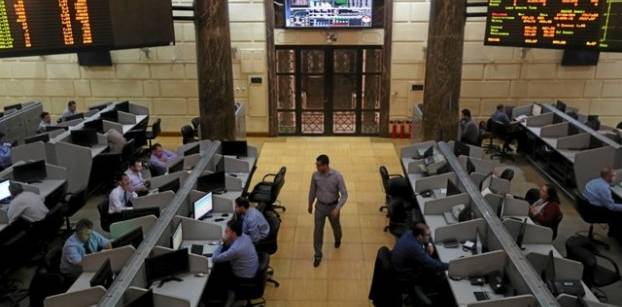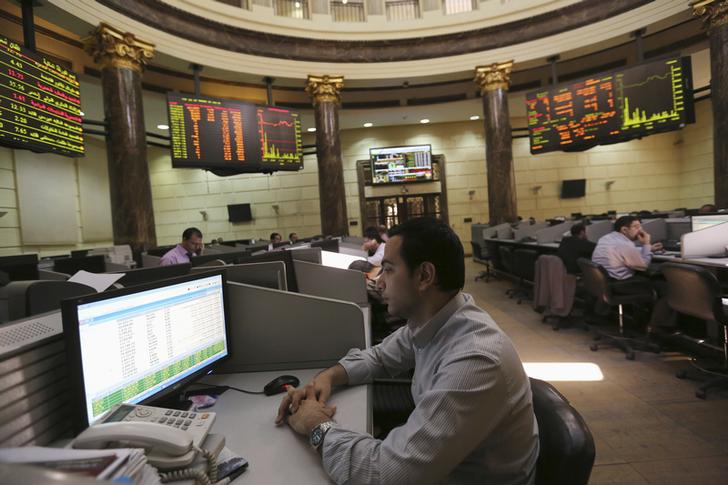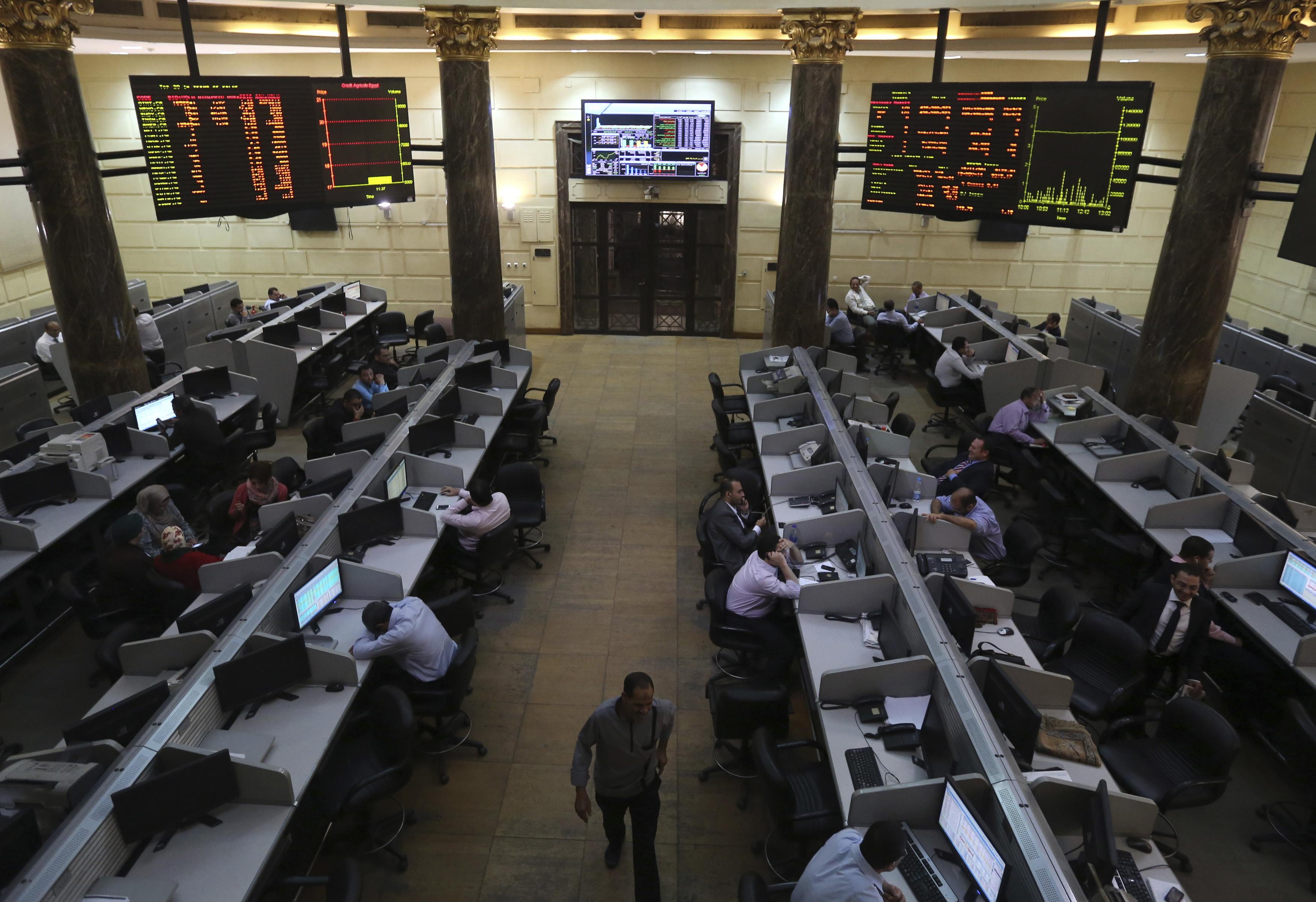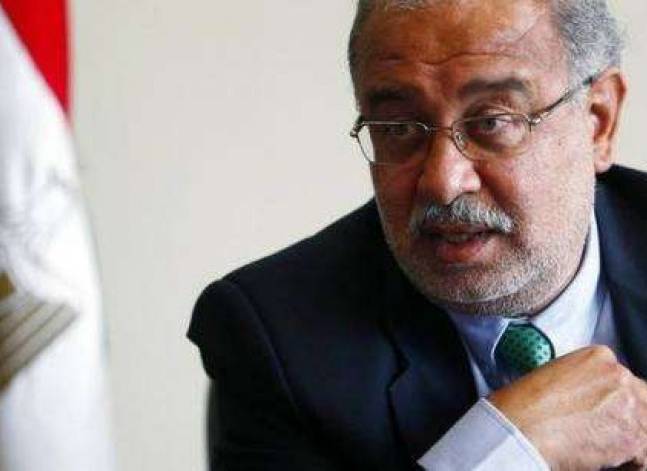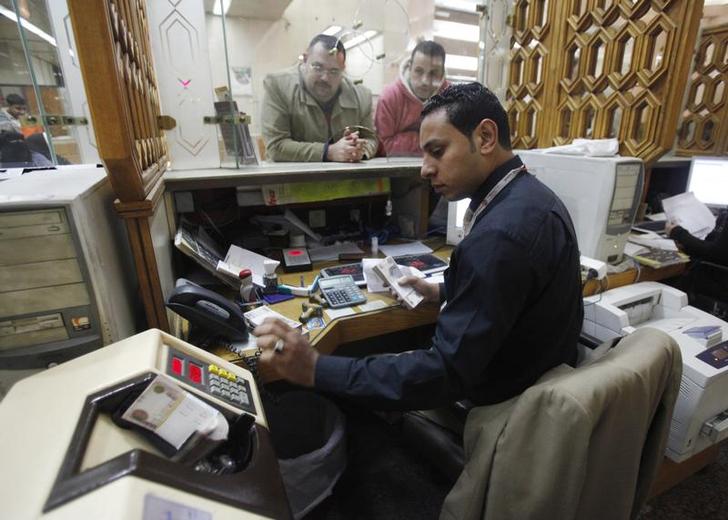Latest NEWS
- Aswat Masriya, the last word
- Roundup of Egypt's press headlines on March 15, 2017
- Roundup of Egypt's press headlines on March 14, 2017
- Former Egyptian President Hosni Mubarak to be released: lawyer
- Roundup of Egypt's press headlines on March 13, 2017
- Egypt's capital set to grow by half a million in 2017
- Egypt's wheat reserves to double with start of harvest -supply min
- Roundup of Egypt's press headlines on March 12, 2017
Lost revenues: How Egypt botched implementation of its capital gains tax law
Traders work at the Egyptian stock exchange in Cairo, Egypt April 18, 2016. REUTERS/Mohamed Abd El Ghany
Nabil El-Essawy, an employee at a food items company heads to an ATM as usual to withdraw his EGP 2,000 salary after tax, only to coincidentally meet a college friend, a stock market investor who told him that he didn’t pay taxes on his EGP 300,000 capital gains from last year.
Many people like Essawy pay a large portion of their income on direct and indirect taxes, but the Egyptian government has recently failed to collect its due taxes from stock market investors like his friend, Ali Abdel Rahman, who make much higher incomes.
Egypt’s weakening economy is losing much needed revenue because it failed to collect capital gains taxes on stock market transactions as required by law, and then inexplicably suspended the law imposing the tax.
The fiscal year 2014/15, in which the Capital Gains Tax Law was enacted, was difficult for the cash-strapped government, which had initiated its “economic reform programme”, mainly involving EGP 30bn cut to energy subsidies and the introduction of new taxes. The aim of those measures was to reduce the EGP 253.7bn budget deficit, which was equivalent to 12 per cent of GDP.
The government, which has faced a steady drop in foreign currency reserves after the mass protests of 2011, relies on taxes for approximately 69 per cent of its revenues, and can ill-afford to forego taxes that it is owed. Yet it has in at least one instance failed to collect them due to a poor implementation system. The way in which the government failed to implement the Capital Gains Tax on Stock Market Transactions Law that took effect in May 2014 is a good example.
In this investigation, Aswat Masriya reveals that Egypt’s Tax Authority failed to collect most of the capital gains tax owed by local investors on their stock market gains during the one-year when the tax was in effect, until its suspension for two years in May 2015.
This failure, which has cost the government revenues worth an estimated EGP 3.4bn ($188mn), was caused by the Tax Authority’s improper implementation of the Capital Gains Tax law and its inability to establish an effective mechanism for collecting it.
The 10 per cent Capital Gains Tax, suspended for two years, then once again in 2016 for three additional years (ends in 2020), had been expected to bring in a minimum of EGP 4bn in each fiscal year, according to official estimates.
“The Authority has so far collected EGP 600mn through the automatic collection method of this tax,” head of the research department at the Tax Authority Ragab Mahrous said. The automatic collection has only been applied to foreign investors, who account for around 20 per cent of stock market transactions, while taxes from local investors were to be collected by asking individual investors to fill out Capital Gains Tax declaration forms.
The application of the Capital Gains Tax Law, issued in May 2014, taking effect in July 2014 following ratification by President Abdel Fattah al-Sisi, came under the purview of former minister of finance Hany Kadry Dimian. Its enactment had been repeatedly delayed following the 2011 mass protests.
As soon as the tax became payable, investors and brokerage companies strenuously objected to it, claiming it would negatively affect the investment climate in Egypt.
Aswat Masriya has investigated those claims, the actual tax calculation method and obstacles to the proper collection of the tax.
Delayed regulation and botched tax calculation crippled implementation
Applying the Capital Gains Tax Law has sparked controversy between the Finance Ministry and the Egyptian Stock Exchange (EGX). As a result, it took a full nine months for the ministry to issue the law’s executive regulations -- which include detailed rules and regulations on how to implement the law, but which must not change or reinterpret it in any way.
In an official statement in April 2015, then-Minister of Finance Dimian said the nine-month delay had occurred “because discussions with all stakeholders took time,” adding that there "were some points that we did not agree on because they don’t comply with the nature of the taxation system in Egypt.”
Authorised by the law, Misr for Clearing, Settlement and Central Depository Company (MCSD) was responsible for calculating the Capital Gains Tax owed on transactions after each trading session and sending that information to the Tax Authority. It was also responsible for automatically collecting the tax from foreign investors.
“We never heard of a capital gains tax that is calculated by using the day on which the tax was applied as a baseline."
According to the Capital Gains Tax Law, investors, who were previously exempted from any taxes on their stock market gains, were obliged to pay a tax equivalent to 10 per cent of net profits on stock market transactions.
The law stipulated that the "10 per cent tax will be calculated on the net value of profits resulting from stock market transactions, such profit being the difference between the value of selling/substituting the stocks and the value of acquiring the stocks, after subtracting brokerage commission.”
However, “the MCSD has used a different calculation method than the one it mentioned in the 53/2014 law,” tax accountant Mohamed Abdel Azim said.
According to a document published on the MCSD website in July 2014, capital gains and losses are measured as the difference between the net selling price of shares and their value on 30 June 2014, even though the law made no mention of referencing the value of stocks on 30 June 2014 as the purchase price. Rather, it defined profits as the difference between the selling and buying prices of the stock in the event that the selling price was higher.
But MCSD, which is 50 per cent owned by brokerage companies, adopted its own method, which involved using the value of stocks on 30 June 2014 in lieu of their original purchase price.
“We never heard of a capital gains tax that is calculated by using the day on which the tax was applied as a baseline for calculating the purchase value of an asset,” said Abdel Azim.
Tax lawyer Ramy Shalash, who is managing director of law firm Abdallah Shalash & Co., agreed that MCSD’s calculation method "had violated the law."
But this calculation has also been criticised for lack of practicality. “If an investor had purchased a stock for EGP 10 in 2008 and the value of the stock was EGP 7 on 30 June 2014 and he later sold it at EGP 9 in the taxable period, the MCSD would calculate that he had made a profit of EGP 2, whereas he actually lost EGP 1,” head of the Egyptian-Swiss Brokerage Company Akram al-Masry explained.
Head of technical analysis at Osoul brokerage company Ehab Saeed said that he filed a lawsuit that year before the Administrative Court accusing the MCSD of violating the law. He had no idea whether the court has viewed the case or not.
MCSD managing director Tarek Abdel Bary said in a phone interview that MCSD calculates taxable profits as the difference between the sale price and either the acquisition value, or the stock value on 30 June 2014, whichever is higher.
“Actually this method alleviates the burden on investors,” Abdel Bary added.
“If the investor had EGP 10 worth of stock earlier, and it was valued at EGP 25 on 30 June 2014, then he sold for at EGP 30, we choose to consider EGP 25 as the initial stock value… it will be better for the investor to be considered as registering EGP 5 in profits, rather than EGP 20,” he said.
Abdel Bary claimed that this calculation method is mentioned in the law, but an examination of the law reveals that it is not. When Aswat Masriya told him that the law did not mention any specific dates to measure on, he said that investors who think the calculation method is not fair to them can submit their transaction records to the Tax Authority, which can later decide if the method was correct or not, depending on the individuality of each case.
Aswat Masriya has spoken to four tax accountants who said this calculation method is different to what is mentioned in the law. But tax accountant Mohamed El-Nafrawy says that this method is the outcome of an informal understanding amongst the MCSD, the Tax Authority and the Ministry of Finance.
Tax Authority blundered in determining the taxable period
Although Law Number 96/2015 that suspended the Capital Gains Tax for two years made clear that the tax would not apply starting 18 May 2015 and for two years, the Tax Authority made a mistake when ordering its affiliated directorates to collect the tax from local investors in November 2015.
The Authority’s Circular 28/2015 exempted the period (January-December 2015) from the tax, even though the period between January and May 2015 was taxable.
The Tax Authority’s argument was that, “any tax amendment issued in the middle of a tax period should apply to all the period.”
Based on that circular, the tax directorates started notifying local taxpayers to pay taxes relating to 2014 stock market transactions, but made no mention of taxes owed from January to 18 May 2015.
“The Finance Ministry had prepared this circular and it was a mistake because the capital gains from the stock market had no correlation with the nature of any tax period, it is an exceptional profit [only applicable if the investors registered profits after selling their stocks],” said Ragab Mahrous, head of the Authority’s Research Department.
After opposition by many tax analysts, who accused the Authority of violating the law, the Tax Authority cancelled the erroneous circular in early 2016, and issued Circular 1/2016, specifying that the correct period during which the tax was applied was the time from July 2014 to 18 May 2015 in compliance with the law.
After MCSD automatically collected EGP 600m from foreign investors only, the Tax Authority became the sole responsible entity for collecting remaining Capital Gains Taxes from local investors. In line with that responsibility, it issued the circular to inform the tax directorates on the procedures for collecting the tax.
Tax not collected from local investors yet
Aswat Masriya has talked to 10 stock market investors, who all reported that they have received notifications from the Capital Gains Tax directorate only once, informing them they have to pay taxes on 2014 transactions.
Despite the amendment of the first circular, the Capital Gains Tax directorate did not send further notifications to taxpayers to pay taxes for 2015 transactions as well.
However, the Capital Gains Directorate claims that it is not its responsibility to take a decision to issue further payment notifications to investors who owe Capital Gains Taxes.
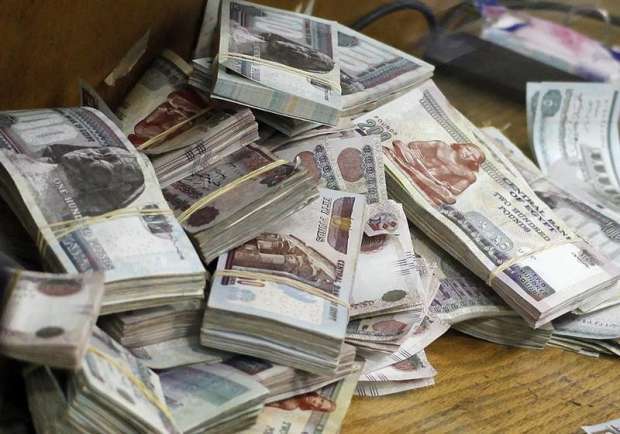
Egyptian currency - Reuters
“The Tax Authority has to issue another order for us to send further notifications… we are only an executive office,” head of the Capital Gains Tax Directorate Khaled Mohie El Din said.
Mohie El Din explained that his directorate depended on a database of investors’ transactions prepared by the MCSD to send notifications to stock market investors “because most of them do not have tax records.” He added that the absence of such tax records excused some investors from paying fines for delays in paying the tax. By contrast, stock market investors who already have tax records would be obliged to pay fines for delayed tax payments.
According to the executive regulation of the law, those who do not head to the Tax Authority to fill tax declarations are obliged to pay a minimum of EGP 5,000 and a maximum of EGP 20,000 in fines.
Stock market investors and brokerage companies that Aswat Masriya has spoken to said that they had not heard of the new circular. When asking the Tax Authority about the reason of this, Mahrous from the Tax Authority said the reason is that the circular is mainly issued for informing the tax directors, not taxpayers.
Mahrous confirmed that the Authority has collected EGP 600m to date in Capital Gains Tax from foreign investors. All 10 local stock market investors and three brokerage companies interviewed for this report said that they have not paid the tax, and did not know clients who had.
Stock market investor Islam AboulFotouh said that he did not pay EGP 30,000 that he owed in capital gains tax because he believes the calculation of the tax is incorrect.
Head of technical analysis at Osoul brokerage company Ehab Saeed, stock market broker Mohamed Bahaa El Din and head of Egyptian-Swiss brokerage firm Akram El-Masry said that all the investors they deal with have still not paid the tax.
A source from the Capital Gains Tax Directorate, who requested to remain anonymous, also said that the tax has not been collected yet from local investors.
A former high-ranking official, who was directly involved in the tax application and asked to remain anonymous, said that the Tax Authority “is not technically qualified to implement this type of tax due to its complexity.”
The Tax Authority will have to issue orders to the directorate to send further notifications to local investors to pay their due taxes, but the Capital Gains Tax Directorate could not say whether the authority will do so or not
In an attempt to find out the value of the losses to the state resulting from the non-collection of capital gains taxes, Aswat Masriya asked MCSD about the value of the uncollected taxes, since MCSD is in charge of determining how much tax each investor owes. However, MCSD’s Abdel Bary said: “The total value is unknown… it is a complicated mathematical calculation.”
Suspension of the Capital Gains Tax Law due to loss claims
Against the backdrop of disagreements between the Finance Ministry and EGX, many stock market investors marched to Omran’s office demanding his and Dimian’s resignation in protest at the “losses” they incurred as a result of the Capital Gains Tax.

Workers in the Egyptian Tax Authority during a protest against the Civil Service Law in front of the Journalists' Syndicate, August 10 2015 - Reuters
The number of stock market transactions fell “as investors wanted to avoid this new tax”, said stock market investor Mohamed Ali.
But Aswat Masriya’s observation of the stock market’s performance tells a different story.
Looking at the stock market indices during the short period when the tax was in effect, the main index EGX-30 may have fluctuated on the short term. Yet, comparing the first month of the tax application and the last month shows that EGX-30 was stable throughout.
These indications contradict with the statement of the head of the EGX, in which he claimed that the Capital Gains Tax “negatively affected” the Egyptian economy, which is inconsistent with the soaring market capitalisation during the tax implementation period.
However, deputy executive director at HC Securities Mohamed Metwally said that these analyses might not reflect EGX’s performance “because the stock market is affected by daily events”.
According to the annual reports of the EGX in 2013, 2014 and 2015, the year 2014 was the best year for the bourse after the 2011 protests, registering the highest performance indices in six years.
The market captalisation reached EGP 500bn during the tax's application, compared to EGP 430bn in 2015, when the tax was suspended.
Despite the absence of evidence that the Capital Gains Tax negatively affected the stock market, the government decided on 17 May 2015 to suspend the tax for two years, with then-prime minister Ibrahim Mehleb endorsing the decision by opening the following day’s EGX trading session.
Prospects of re-imposing the tax next year
Osama Diab, a tax policies researcher at the Egyptian Initiative for Personal Rights (EIPR), explained that the government always blunders in implementing taxes that embody social justice, such as the Capital Gains Tax and the Property Tax, which the Tax Authority is also facing challenges in collecting.
“The taxes are meant to be paid even if the taxpayer sees it as unfair,” tax expert Hany El-Husseiny said, describing the local investors’ objections to paying the Capital Gains Tax as “a huge tax avoidance incident in Egypt.”
The government was supposed to re-impose the Capital Gains Tax next year, but in November it further postponed it to additional three years. In order to avoid the complications that happened in the initial application of the tax, it needs to take some procedures to address the tax calculation and collection methods.

